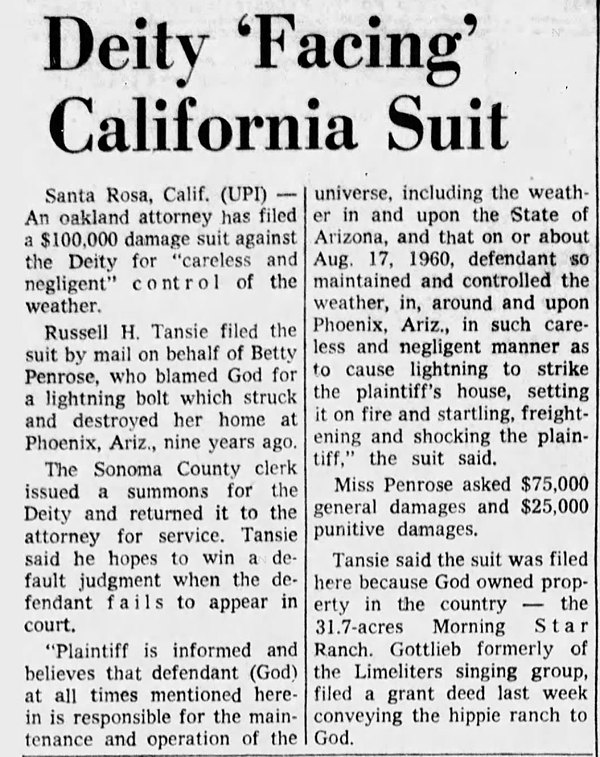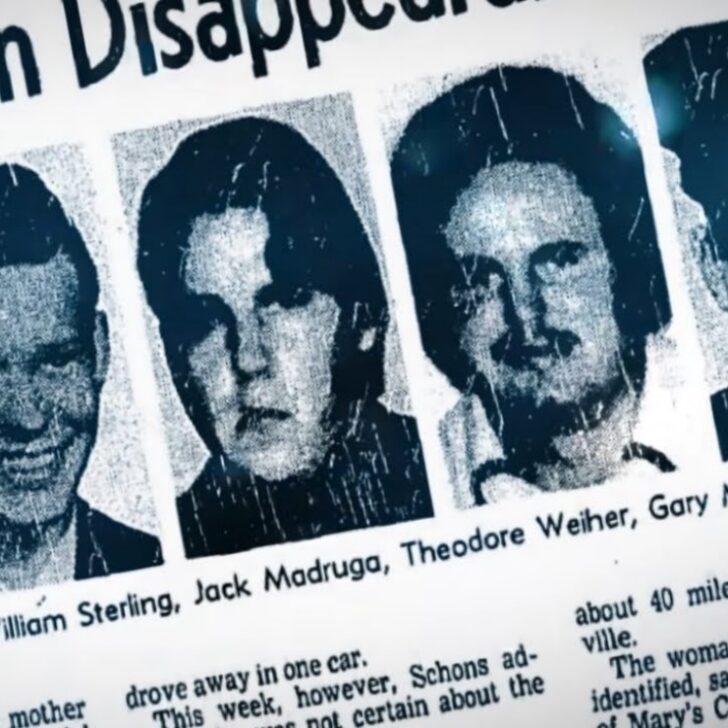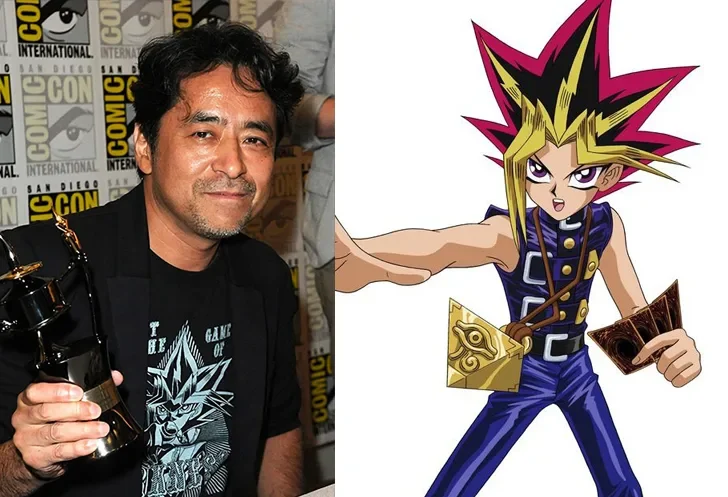The skies above Betty Penrose’s Phoenix, Arizona, home had grown dark and ominous. The date was August 17, 1960, and the worst summer storms were mostly finished. Or at least they should have been.
As the darkness coalesced above the secretary’s home, a sudden bolt of white cracked forth from the clouds. Lightning struck the roof, igniting the structure, which continued to burn long after the initial strike.


Betty Penrose lost so much that day, but what could she have done to prevent such destruction? After all, a lightning strike was simply an act of God.
It took nine years, but eventually, Betty would attempt to get justice for what happened to her. Betty Penrose tried to sue God.
Suing A Deity: What Is An Act Of God?
One might think that Betty Penrose’s attempt to sue God stemmed from the woman’s ignorance of the legal system. In reality, Betty at least had a passing familiarity with the industry. After all, she was the secretary of lawyer Russel H. Tansie.
Even if Betty wasn’t familiar with act of God clauses, Russel certainly was. This clause, as well as a legal case being fought in California, would be the basis of Betty’s case.
An act of God is an unforeseen and uncontrollable event, usually a natural disaster, that can’t be anticipated or prepared for. When an act of God occurs, the insurance holders can’t be held accountable.
What happened to Betty Penrose’s home was undoubtedly an act of God. Usually, this would imply that no one is responsible for the damage. But in the eyes of Betty and Russel, if the lightning strike was an act of God, then shouldn’t God be responsible?
Before Betty’s legal battle, folk singer Lou Gottlieb, bassist for the band The Limeliters, was trying to gift his land to God.
Gottlieb had started a commune in California called Morning Star Ranch. The enormous property provided the needy with food and a place to live. He believed in the concept of land belonging to everyone, and his hippie commune manifested that idea.
Unfortunately, Morning Star Ranch violated several local health and safety codes. He was taken to court by the county district attorney, who demanded the commune be disbanded and cleaned up.
The bassist was not fond of this idea and instead tried to deed Morning Star Ranch to God. If God owned the ranch, the attorney would have to go after the deity for the fines and violated codes.

Eventually, Judge Kenneth Eymann ruled that God couldn’t own property–at least in the State of California. Judge Eymann would declare, “The grantee must be a person, either natural or artificial, in existence at the time of the conveyance and capable of taking title.”
This meant Gottlieb would have to deal with his own property. But before the case was settled, one Russel H. Tansie, Arizona lawyer, got wind of the case.
He thought if God could own Morning Star Ranch, couldn’t he be held responsible for the lightning that destroyed Betty’s home?
Betty Penrose Vs. God
Russel T. Tansie’s idea was simple. Lou Gottlieb’s case was still active, which meant there was a decent chance that God could legitimately become the owner of Morning Star Ranch.
As an owner of property, God became more than just a nebulous idea. God would own property, which held real-life monetary value. Owning Morning Star Ranch meant that God could be sued for damages, like the lightning strike damage to Betty’s home.
It had been nine years since Betty’s home was destroyed, but Tansie still believed there was a case to be had, even after nearly a decade. He could potentially net his client (and secretary) a significant sum without ever facing the defendant in court.
Russel T. Tansie would be quoted as saying, “Plaintiff is informed and believes that defendant (God) at all times mentioned herein is responsible for the maintenance and operation of the universe, including the weather in and upon the State of Arizona.”
His suit would continue, “on or about Aug 17, 1960, defendant so maintained and controlled the weather…in such a careless and negligent manner as to cause lightning to strike the plaintiff’s house, setting it on fire and starling, frightening, and shocking the plaintiff.”
Betty Penrose wasn’t asking for a small amount from God, either. She sought $75,000 in general damages and $25,000 in punitive damages.
While $100,000 may sound reasonable, it amounts to a staggering $854,354 today when adjusted for inflation. Betty and Tansie remained hopeful that God had deep pockets.
Russel T. Tansie had wasted no time in suing God on Betty’s behalf. He filed his suit a week after Lou Gottlieb attempted to deed his ranch to God. This meant that Gottleib’s case was still in limbo.
It was assumed Gottlieb would lose (which he did). By moving quickly, Tansie could act before this loss was made certain, giving his suit a fighting chance.
Incredibly, the suit was filed by mail and accepted, officially becoming a court case. A summons was issued to God by the Sonoma County Clerk of Courts.
God’s Lawyer
Before Betty’s case could go in front of a judge, an odd offer came echoing out of Kenya.
Joseph Njue of Nairobi, Kenya, took offense to Betty and Tansie’s suit against the deity. He read about Betty’s case in his local newspaper and felt called to assist. Njue didn’t want to assist the secretary in the case of her ruined home, though. He wanted to defend God.
In a letter from Joseph Njue to the U.S. Attorney General, he pleaded, “I would request you kindly to hold this case until I try and get enough finances to come there and defend the God in the court”.
Njue’s letter would continue, “There is no state constitution law covering the God’s behavior and I will indeed defend him whatever the cost.”
As far as we know, Joseph Njue never made it to the United States. When it was time for God to face the mortal judge, there was no one there to defend him.
Winning A Lawsuit Against God
Betty’s court case was bizarre, to say the least. Tansie had managed to put the suit together in such a way that it had to be taken seriously, at least in the legal sense, even if it was a laughingstock in reality.
But Russel T. Tanise knew how he could win the case despite the ridicule. Tansie’s case was based on the fact that if a defendant didn’t show up to court, the victory was granted to the plaintiff by default.
Since it was highly unlikely that God would show up in court, Tansie figured the case might be an easy win. An absent defendant should have equaled victory.
When God’s day in court rolled around, Russel T. Tansie and Betty Penrose were present. The minutes ticked by, and still, the defendant’s stand was empty. God was a no-show for his first (but surprisingly not last) court case.
Because God didn’t show, Betty Penrose did indeed win her suit by default, just as Russel T. Tansie had planned.
Unfortunately for Betty, Tanise, and even Lou Gottlieb, it was an empty victory. God didn’t show up in court because he couldn’t. Similarly, God couldn’t pay for Betty’s damages, either. Betty Penrose’s victory was one in name only. No one was ever truly going to pay for the lightning strike on her home.
God Can’t Own Land, Betty Penrose’s Victory Rendered Invalid
Despite Betty’s victory in court, she and her lawyer had to know that the money was never coming. Still, at least they had their odd victory to fall back on. It was better than nothing. Too bad it was only temporary.

A little over a year after Lou Gottlieb tried to deed Morning Star Ranch to God, the land transfer was declared invalid. According to the judge in the case, land could only be owned by a “natural or artificial person”, of which God was neither.
Lou Gottlieb would be held in contempt of court for his bogus attempt to give his land to God. An injunction from the court would declare that only Gottlieb and his family could live on the ranch.
This ended his dream of a hippie commune haven. He would also be forced to pay fines and even spend a week in jail.
The dominos from this decision continued to fall, making their way towards Betty Penrose’s case. The entire basis of Russel T. Tansie’s suit was that God owned land, so he could be sued. With Gottlieb’s case rendered invalid, Betty’s case would also be null and void.
Betty Penrose, despite her brief victory, would never see a penny. It may be monetarily worthless, but she would go down in history as one of the only people to ever have a legal win over God himself.
Sources
https://www.weirduniverse.net/blog/comments/woman_who_sued_god_and_won
https://www.fightingforyou.com/resource-center/articles/act-of-god-clause
https://www.ijlet.org/wp-content/uploads/2023/03/2022-3-44-52.pdf













Leave a comment